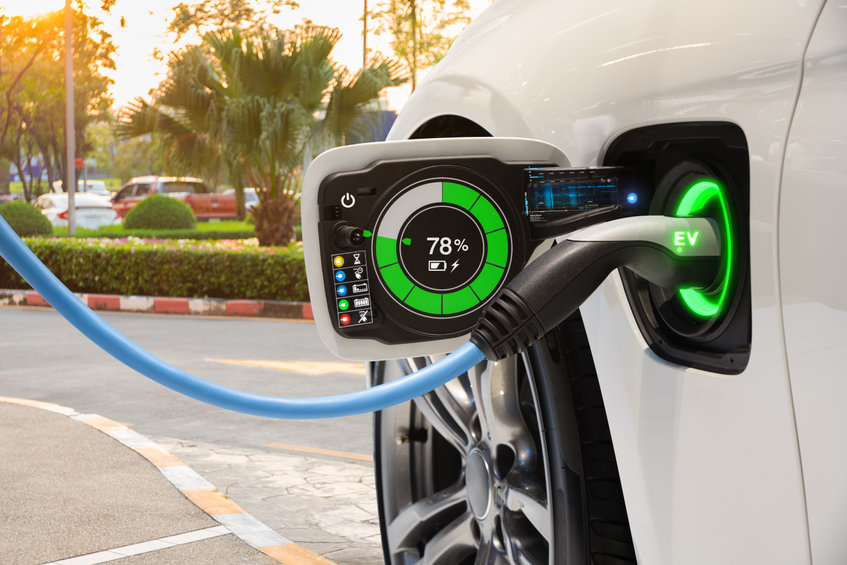Take a peek inside the car factory of one of Germany’s biggest automakers right on the southern edge of Brussels, where the city transitions into suburbs. On a first glimpse inside, there is a peculiar feeling to the factory as there are batteries stacked to the rafters instead of the exhaust pipes, transmissions, or fuel tanks that you will encounter in a traditional car factory. You can see 36 shoebox-sized battery modules, each containing a dozen lithium-ion cells that are packed inside a 7-foot long battery pack. The battery pack is slung under the floor of each SUV in production at this facility.
The production of Volkswagen’s first electric SUV from the luxury Audi brand, the Audi e-Tron is done in this facility. Perks of the e-Tron SUV include a battery range of nearly 250 miles, charging in little less than half an hour, luxurious interiors, conventional EV styling, and a smooth ride. If things go as planned, the Volkswagen Group will outclass rivals like Tesla in global sales of electric cars and also ward off stern challengers from China and Silicon Valley. All of this is dependent on the global success of the e-Tron SUV.
Like Volkswagen, many other established automakers are changing their business philosophy to one that adapts to a world in which electric cars have replaced gasoline or diesel cars. Here we highlight how the great electric race will heat up immensely in the forthcoming, and what investors and car enthusiasts could expect in the upcoming years.
The great electric race
Factories around the world are overhauled to produce electric cars in massive numbers. Automakers are striving to create the best battery pack for their EVs, just to get a slight edge over their rivals. The cost of production of EVs is high enough for automakers, compelling them to find new partners in order to ramp up their production.
Volkswagen is spending $34 billion to electrify or hybridize almost every car in its lineup. By 2028, the German marquee plans to launch 70 new electric models by as early as 2028. It is spending billions of dollars to retrofit factories from Germany to China, to produce cars based on its modular electric car production platform, or MEB.
The lofty ambitions set by Volkswagen also require expensive initiatives. But with so much investment put in EVs from Volkswagen and other automakers and the new stringent emissions target set by regulators, there is no turning back at this point. The electric car race is about to get heated up. But the question is, will Tesla remain at the top of the pile in the global EV race?
The checkered history of EVs
According to automotive history, EVs failed to make an impact when they were first introduced. General Motors’ EV1 made its debut on American streets in 1996. Unfortunately, the model was canceled in 2003, amidst the angry cries of customers. Even Chevrolet discontinued its Volt EV, as it failed to significantly impact the sales charts. Even the Nissan Leaf failed to achieve any commercial success despite lofty expectations from the former chairman, Carlos Ghosn.
Even Volkswagen didn’t bother to experiment with electric cars until recently. The company shelled out its investment dollars into diesel engines to eclipse Toyota in the sales charts. Back in 2018, Volkswagen sold a record 10.8 million cars, out of which only 0.4% were electric. It was only until the success of Tesla, the brainchild of enigmatic entrepreneur Elon Musk that global automakers began to take notes of the potential of electric cars.
Tesla was the first to break out into the EV market scene, selling over 220,000 EVs in 2018. The global alliance of Renault, Nissan, and Mitsubishi Motors managed to sell roughly 130,000 EVs in 2018. In comparison, BMW and Daimler sold only 33,000 and 14,000 electric units respectively.
How other automakers stack up against Tesla
Tesla has one major advantage compared to other automakers, that is they don’t have any excessive baggage. The American entity has kept things simple at its end as it doesn’t have a big dealership network, entrenched unions, or a legacy business to manage. For traditional automakers, settling into the EV market is a very costly exercise. These automakers can’t just give up on their conventional activities that help them generate the most revenue. For instance, they can’t stop selling their internal combustion engine-powered cars.
The urgent need to free up cash for future endeavors is creating never-seen-before alliances in the automotive industry. BMW and Daimler, traditionally fierce German rivals for ages, have joined hands to focus their energy on building highly automated and autonomous driving. Both the German marquees are shelling out $1 billion as an investment for new mobility services, which includes ride-sharing and charging systems for electric cars.
Meanwhile, Ford will develop new vehicles based on Volkswagen’s electric platform based on the deal that they had announced this July. Likewise, Volkswagen and Ford have both joined forces to invest in ArgoAI, an autonomous vehicle company valued at $7 billion. Back in May, Fiat Chrysler proposed a merger with Renault. This would have easily been the world’s third-largest automotive firm with annual cost savings of more than €5 billion ($5.6 billion).
Unfortunately, the deal didn’t go through, and Renault expressed its discontent on the lost potential of a merger with great financial merit.
The rise of the global EV market
According to LMC Automotive, the huge amount of investment that Volkswagen has poured into the production of EVs will enable it to sell over 1.4 million electric cars a year by 2025. This whopping number is more than 3 times the sales Tesla has predicted for the future. The big alliance of Renault, Nissan, and Mitsubishi Motors is expected to rank in 2nd, by selling almost 590,000 electric vehicles by 2025. China-based Geely, which owns Swedish brand Volvo, will take 3rd place. Tesla on the other hand only ranks 4th with around 413,000 EVs, while Toyota, Daimler, Hyundai, General Motors, and Ford follow close suit with expected sales of between 330,000 and 400,000 cars in 2025.
Volkswagen’s resources and expertise in the production sectors will help them take an edge over Tesla. The American stalwart is facing the heat from new luxury car EVs as well, which is inhibiting its ability to produce EVs more efficiently. Speaking of which, the entire industry is gearing up to challenge Tesla at its own game. Ford CEO Jim Hackett recently disclosed his company’s lofty plans for the future and took a shot at Musk, the CEO of spacecraft company SpaceX. “We have to have an industrial model. Ford is really good at this. I happen to compete with a rocket scientist who’s really smart, and I respect that about him. And yeah, he’s competing with the ultimate disrupter in Henry Ford.”
In the current scenarios, Tesla does have a clear advantage over its rivals. Tesla aims to sell 360,000 and 400,000 vehicles this year. Once its mega-factory in Shanghai goes live, the production capacity could ramp up to 500,000 vehicles. Various rumors have also suggested that its nearest rival, the Porsche Taycan Turbo S isn’t the ‘Tesla Killer’ it is proclaimed to be. Car analysts claim that the Taycan will be half a second slower in the 0-60 mph run than the Tesla Model S, and the former will also be far behind in terms of range.
Porsche backed up its Taycan Turbo S by saying that performance is more than just raw speed. The Taycan will undoubtedly sport fine craftsmanship and materials, but buyers will definitely have to shell out more bucks. The base model sells for at least €90,000 ($100,000) in Germany, and the Turbo version will cost upwards of €150,000 ($167,000). Comparatively, the base Tesla Model S is almost $50,000 less in terms of price.
It is high time that people fully embrace EVs for all their perks and cons. Thirty years ago or 40 years ago, the diesel engine was a no-show among car enthusiasts. But today, you can clearly see the impact of the diesel engine on global car sales. The same goes for EVs and electric mobility. Most EVs built today are meeting the expectations of every customer. In March, when Musk unveiled the Model Y, he said, “Our goal all along has been to try to get the rest of the car industry to go electric.” Musk’s wish is becoming true after all.




